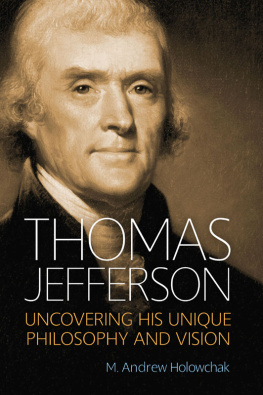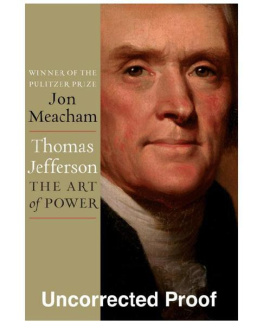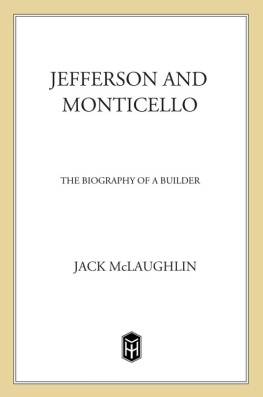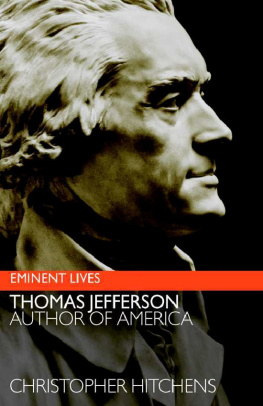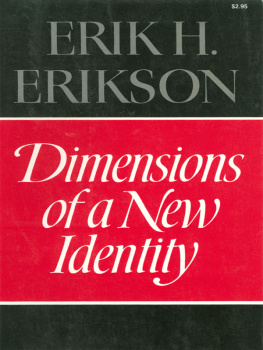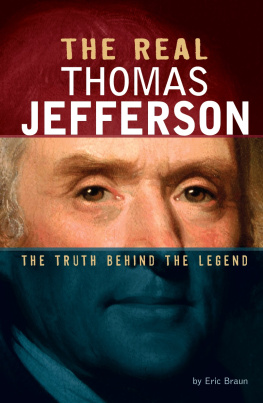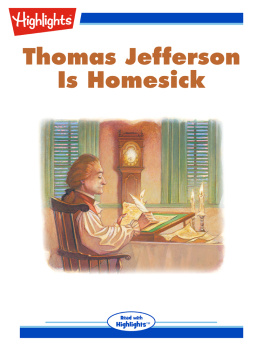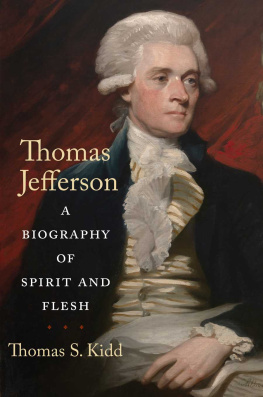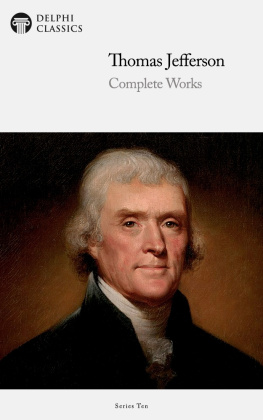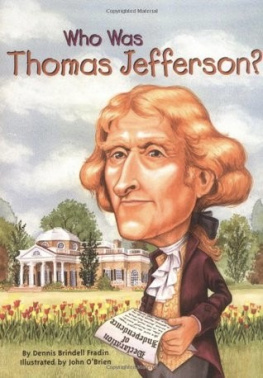Jefferson Thomas - Thomas Jefferson and the New Nation: a biography
Here you can read online Jefferson Thomas - Thomas Jefferson and the New Nation: a biography full text of the book (entire story) in english for free. Download pdf and epub, get meaning, cover and reviews about this ebook. City: London, year: 1975;1970, publisher: Oxford University Press USA - OSO, genre: Detective and thriller. Description of the work, (preface) as well as reviews are available. Best literature library LitArk.com created for fans of good reading and offers a wide selection of genres:
Romance novel
Science fiction
Adventure
Detective
Science
History
Home and family
Prose
Art
Politics
Computer
Non-fiction
Religion
Business
Children
Humor
Choose a favorite category and find really read worthwhile books. Enjoy immersion in the world of imagination, feel the emotions of the characters or learn something new for yourself, make an fascinating discovery.

- Book:Thomas Jefferson and the New Nation: a biography
- Author:
- Publisher:Oxford University Press USA - OSO
- Genre:
- Year:1975;1970
- City:London
- Rating:5 / 5
- Favourites:Add to favourites
- Your mark:
- 100
- 1
- 2
- 3
- 4
- 5
Thomas Jefferson and the New Nation: a biography: summary, description and annotation
We offer to read an annotation, description, summary or preface (depends on what the author of the book "Thomas Jefferson and the New Nation: a biography" wrote himself). If you haven't found the necessary information about the book — write in the comments, we will try to find it.
Jefferson Thomas: author's other books
Who wrote Thomas Jefferson and the New Nation: a biography? Find out the surname, the name of the author of the book and a list of all author's works by series.
Thomas Jefferson and the New Nation: a biography — read online for free the complete book (whole text) full work
Below is the text of the book, divided by pages. System saving the place of the last page read, allows you to conveniently read the book "Thomas Jefferson and the New Nation: a biography" online for free, without having to search again every time where you left off. Put a bookmark, and you can go to the page where you finished reading at any time.
Font size:
Interval:
Bookmark:
THOMAS JEFFERSON AND THE NEW NATION


Thomas Jefferson in 1800. Portrait by Rembrandt Peale.
A BIOGRAPHY
Merrill D. Peterson

Copyright 1970 by Oxford University Press, Inc.
Library of Congress Catalogue Card Number: 70-110394
First published by Oxford University Press, New York, 1970
First issued as an Oxford University Press paperback,1975
ISBN 978-0-19-501909-4
Printing, last digit: 24 23 22 21 20
Printed in the United States of America
on acid-free paper
FOR
JEFFREY AND KENT
The Past is also stored in thee
THE PRESENT WORK grows out of a line of inquiry commenced some twenty years ago. In the Preface to The Jefferson Image in the American Mind, in 1960, I forewarned the reader that the book dealt not with Thomas Jefferson but with his shadow, not with the living but with the posthumous figure, not with the history he made but with what history made of him. Thomas Jefferson and the New Nation treats the historical Jefferson, and in this sensein the sense of shadow and substancemay be viewed as a biographical companion to the former work.
The Jefferson Image suggested that the historical Jefferson could never be truly discovered. The point strikes me even more forcibly now after more years of research and reflection. Jefferson became so much a part of the nations ongoing search for itself, so deeply implicated in the whole epic of American democracy, that succeeding generations were unable to see him clearly and objectively in his own life and time. This is, I think, less the case today than it used to be, for in our kinetic age the epic itself has gradually receded from view and the twin hysterias of exaltation and denunciation that once surrounded the Jefferson symbol have given way to a more neutral climate in which scholars might assert their legitimate claims and seek to restore the integrity of the historical personage. Even now, however, the student of Jefferson cannot be truly detached and disinterested. I have not been, though I have sought that disciplined subjectivity someone has defined as the essence of the historians craft.
In addition to the first obstaclethe obstacle presented by the Jefferson imagethe biographer must also contend with the obstacle of the man himself. He was so closely identified with the first half-century of the nations history that the human figure fades into the events massed around it. His life exhibited seemingly bewildering conflicts and contradictions, and it is not easy to resolve these elements in the flow of experience. He was a prodigy of talents. The tributaries of his mind ran in all directions. To trace their channels into the main stream is only half the problem, for the terrain itself belongs to another intellectual world, which challenges understanding on its own terms and yet must be translated into the grammar of our own time. Although he left to posterity a vast corpus of papers, private and public, his personality remains elusive. Of all his great contemporaries Jefferson is perhaps the least self-revealing and the hardest to sound to the depths of being. It is a mortifying confession but he remains for me, finally, an impenetrable man.
All this is said not by way of apology for what follows but simply to disclaim any intention of revealing that Platonic abstraction, the real Jefferson, or of offering a definitive life of the man. So far as such a life is attainable, it is being written by Dumas Malone in his magnificent series, Jefferson and His Times, of which three volumes have thus far appeared. And in a different medium, the medium of editorial scholarship, Julian P. Boyd is producing the authoritative work in his monumental edition of The Papers of Thomas Jefferson, still a longer way from completion. These are the greatest of all works of Jefferson scholarship. My own is a cockboat by comparison. In the course of the work I have sometimes been asked, in tones ranging from curiosity to dismay, if anything important remained to be said about Jefferson. I have usually replied that he is one of those men about whom the last word can never be said, that he demands continual re-study and re-evaluation, and quite aside from the merits or the faults of my own effort, it was one I felt bound to make as a part of my own education. I hope, of course, it may also be of use to others.
Within the limits of a single volume I have tried to write a basic narrative of Jeffersons life formed by my own understanding of its place, its problems, and its importance in the history of the United States as the first revolutionary new nation. Such an approach is necessarily selective. The emphasis throughout is on Jeffersons public career, though this cannot be isolated from his private affairs, and also on the fascinating traffic between Jeffersons mind and the surrounding environment. I have aimed at neither a personal nor even an intellectual biography but, rather, at a history of Jefferson in the making of the new nation. The conceptual scheme expresses, it seems to me, the paramount interest of Jefferson to our time. Each American generation has had its own perspective on the founding and the founders. In the case of my generation, which came of age in the Second World War and has witnessed shattering global upheaval for a quarter-century, the experience throws into sharp relief the nations beginnings in another age of revolution, the age of the democratic revolution, in Robert R. Palmers conception, and its struggles to survive and prosper in the turbulent Atlantic world. The United States holds a very different position in todays worldthe lamb has become the lionyet its early history may help to recall Americans to a spirit and a purpose still valuable and, one trusts, not without relevance to old and new nations alike in our time. No other founder had a longer or larger influence on the life and the hopes of the New World prodigy than Thomas Jefferson. Rising to fame as a leader of colonies in revolt against an empire, he embodied the nations aspirations for freedom and enlightenment, and throughout most of his life he was intellectually and politically engaged not only in American affairs but in the affairs of a world unhinged by war and revolution.
Without forcing the multitudinous events of Jeffersons life into an arbitrary pattern, I have thought they might be interpreted, on the whole, in the light of three dominant motifs: democracy, nationality, enlightenment. The terms are meant as symbols for whole clusters of principles and actions and passions, not altogether coherently arranged. By democracy I refer to the gradual emergence in Jefferson of a revolutionary creed of liberty, equality, and popular government. By nationality I mean to embrace his sense of the newness of the new nation, his amor patriae, all his directives toward independence, cultural or political or economic, and his efforts to define Americas place in the community of nations. By enlightenment I wish to emphasize Jeffersons thrust beyond nationality to the cosmopolitan fraternity of science and philosophy, his commitment to the civilizing arts, to education, to progress, to rationality in all things, and his participation in the eighteenth century campaign to enlist man in the cause of nature and nature in the service of mankind.
Next pageFont size:
Interval:
Bookmark:
Similar books «Thomas Jefferson and the New Nation: a biography»
Look at similar books to Thomas Jefferson and the New Nation: a biography. We have selected literature similar in name and meaning in the hope of providing readers with more options to find new, interesting, not yet read works.
Discussion, reviews of the book Thomas Jefferson and the New Nation: a biography and just readers' own opinions. Leave your comments, write what you think about the work, its meaning or the main characters. Specify what exactly you liked and what you didn't like, and why you think so.

